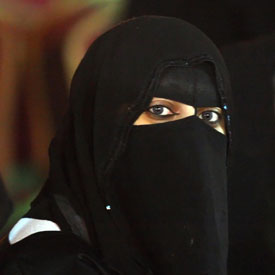Women given right to vote in Saudi Arabia
King Abdullah of Saudi Arabia announces that women will be able to run as candidates in municipal elections and “even have the right to vote”.
In a five minute speech the king announced the moves in a major shift for the conservative Islamic kingdom.
He also announced that women will be able to take part in the next session of the Shura council, which casts a vetting eye on all legislation.
“Because we refuse to marginalise women in society in all roles that comply with sharia, we have decided, after deliberation with our senior ulama (clerics) and others… to involve women in the Shura Council as members, starting from the next term,” he said in his speech to the council.
“Women will be able to run as candidates in the municipal election and will even have a right to vote.”

A campaigner for women’s involvement in the municipal elections said that they may herald a domino effect of other changes.
“Despite the issue of the effectiveness of these councils, women’s involvement in them was necessary. Maybe after women join there will be other changes,” said Naila Attar, who organized a campaign Baladi (Arabic for My Country).
“I believe this is a step to involve women in the public sphere. It is the top of the pyramid and a step in the direction for more decisions regarding women.”
Saudi Arabia follows a strict version of Islamic law that enforces a segregation of the sexes.
Women in Saudi Arabia must have written approval from a male guardian – a father, husband, brother or son – to leave the country, work or even undergo certain medical operations.
The king did not address the equally sensitive issue of women being allowed to drive. Although there is no written law against women driving, they are not issued licences, effectively barring them.
King Abdullah has long been pushing cautious political reforms, but in a country where conservative clerics and senior members of the ruling family oppose even minor changes, liberalisation has been very gradual.
He authorised the building of a new university for both male and female students and encouraged women to participate more in the labour market.
Despite calls on social media for widespread protests in Saudi Arabia during the Arab Spring, the only noteworthy demonstrations were confined to the country’s Eastern Province, which is home to the country’s Shi’ite minority.